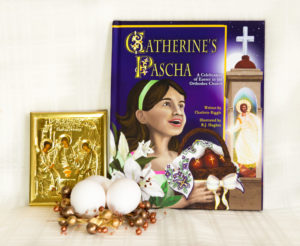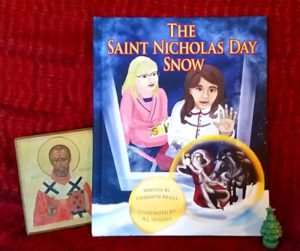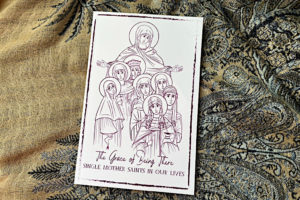When we celebrate the Annunciation, we celebrate the moment when God, the King of heaven and Creator of all, saw Himself as a homeless person and made Himself a beggar. All of heaven was His throne, and the earth His footstool. And yet He asked a human being, a young woman, for shelter. And, like a beggar, He waited for her to respond.
She considered the request. This divine Beggar didn’t ask her for a few coins. He asked her to give Him her flesh and shelter Him in her womb. As God waited, she thought about what this would mean. When she said yes, in that moment, time, space, all that is and was and will be, turned inside out, and the uncontainable God was contained in her womb, for the salvation of the world.
And since that moment, when we see any human being, but especially when we see someone begging, we see God. As God waited for Mary’s gift, He waits for our gifts. And when we say yes, when we give to Him by giving to that beggar, He grants us the gift of joining the Theotokos to bring salvation to the world.
Mary understood that when God made a home in her womb, it changed the relationship between rich and poor. As Mary explained to her kinswoman Elizabeth, the Incarnation put God clearly on the side of the poor, and against the rich: “He has put down the mighty from their thrones, and exalted the lowly. He has filled the hungry with good things, and the rich He has sent away empty.”
As a result, it is necessary for us to give alms.
Readings on almsgiving
Almsgiving is as much a part of our spiritual preparation for Pascha as prayer and fasting. In a homily on fasting and almsgiving attributed to St. John Chrysostom, we are told:
Surely you see the multitudes of poor people in the street, how they remain outdoors even though they are sick or naked? Some are younger, some are older, some of them are leaning on one another for support—how great is their misfortune! Give, therefore, to your fellow servants, so that you might have the Master in your debt, for he gladly becomes your debtor and pays back your investment with interest. … Consider who it is that begs of you through the poor man and attend to the dignity of the one who receives. Yes, the poor man receives, but it is God who is the borrower. Understand to what depths the Master descended to accomplish this, so that he might turn you back from cruelty and hatred: For you saw me hungry, and you did not feed me; thirsty, and you did not give me to drink; a stranger, and you did not welcome me; naked, and you did not clothe me (Mt 25:35-40). Will you not therefore give to Christ in his hunger?
If we’re not sure exactly what almsgiving ought to look like in our lives, we can find examples of almsgiving in the lives of the saints, from St. John the Almsgiver and St. Peter the Tax Collector to Mother Olga of Alaska and St. Brigid of Ireland.
And if we need practical advice and instruction, we can get that as well:
- How to give alms to the homeless
- How to give socks to homeless people
- Giving money to homeless people is okay
- 5 reasons I give money to the homeless
It can be hard to see panhandlers as people, to see the face of God in the beggar with the cardboard sign. We have to learn that the hardness is in our hearts. May God soften our hearts, by the prayers of his Mother.
Read More
Implications of the Annunciation: Jesus shares his human nature with each of us. The implications of that are profound – and perhaps a little frightening.
When names matter more than money: If you can’t give money to the poor, you can give them something that they might need even more: You can call them by name.
Upon the Annunciation and Passion: In 1609, the Annunciation and Holy Friday fell on the same day. In response, John Donne composed one of the most sublime poems ever written.
Books by Charlotte Riggle

Catherine’s Pascha shares the joy of Pascha through the eyes of a child. Find it on Amazon or Bookshop.org.
![]()

The Saint Nicholas Day Snow is filled with friendship, prayer, sibling squabbles, a godparent’s story of St. Nicholas, and snow. Lots and lots of snow. Find it on Amazon or Bookshop.org.
![]()

In The Grace of Being There, women who are, or have been, single mothers share stories of their relationships with saints who were also single mothers. Charlotte’s story of the widow of Zarephath highlights the virtue of philoxenia. Find it on Amazon or Park End Books.




